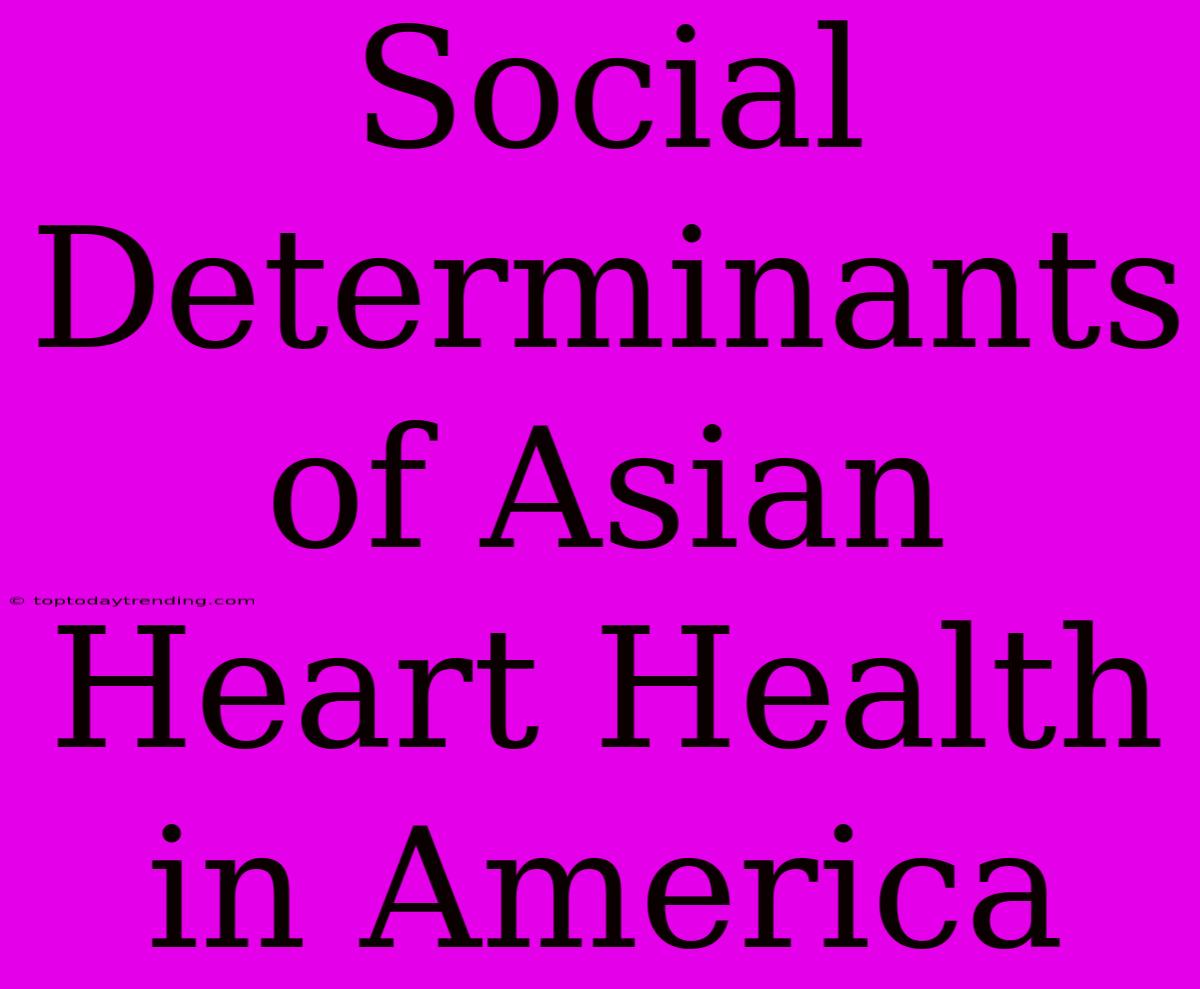Social Determinants of Asian Heart Health in America
The United States is home to a diverse population of Asian Americans and Pacific Islanders (AAPI), a group that faces a unique set of challenges in achieving optimal heart health. While overall, AAPI individuals have lower rates of heart disease compared to other racial groups, they experience significant disparities in access to healthcare and health outcomes. This article dives into the social determinants of health that contribute to the health disparities experienced by Asian Americans and Pacific Islanders in the United States, focusing on cardiovascular health.
Understanding Social Determinants of Health
Social determinants of health are the non-medical factors that influence an individual's health and well-being. These factors include:
- Economic stability: Income, employment, food security, housing stability.
- Education: Access to quality education, literacy levels, and health literacy.
- Social and community context: Social support networks, community safety, and discrimination.
- Healthcare access: Availability, affordability, and quality of healthcare services.
- Neighborhood and built environment: Access to healthy foods, safe places to exercise, and transportation options.
These factors are interconnected and can have a profound impact on an individual's overall health, particularly when it comes to heart health.
Social Determinants Impacting Asian Heart Health
1. Language barriers: Limited English proficiency can create significant hurdles in accessing healthcare services, understanding health information, and communicating with healthcare providers. This can lead to delayed diagnosis, missed appointments, and suboptimal care.
2. Cultural and linguistic differences: Differences in cultural beliefs and practices, including dietary habits and communication styles, can impact how healthcare is received and perceived. Some Asian cultures may have a higher tolerance for symptoms or a preference for traditional remedies, leading to delays in seeking medical attention for cardiovascular issues.
3. Immigration status: Immigrants often face significant economic and social challenges, including language barriers, limited access to healthcare, and cultural adaptation. These stressors can increase the risk of developing cardiovascular disease.
4. Healthcare access and affordability: While AAPI individuals may have higher rates of insurance coverage compared to other minority groups, they may still struggle with high out-of-pocket healthcare costs, leading to delayed or avoided care.
5. Discrimination and stigma: Racial discrimination and implicit bias within the healthcare system can lead to disparities in treatment and care. This can manifest in the form of misdiagnosis, delayed treatment, or inadequate attention to the specific needs of AAPI patients.
6. Limited cultural sensitivity in healthcare settings: Healthcare providers may lack the cultural sensitivity and understanding needed to effectively communicate and provide culturally appropriate care to AAPI patients.
7. Food insecurity and dietary patterns: Access to healthy, culturally appropriate foods can be limited for AAPI individuals, especially in low-income communities. This can lead to dietary patterns that contribute to risk factors for cardiovascular disease, such as high sodium intake and limited fruit and vegetable consumption.
8. Physical activity and environmental factors: Limited access to safe and accessible places for physical activity and green spaces can further exacerbate health disparities.
Addressing the Disparities
To address the social determinants of health impacting Asian heart health, a multi-pronged approach is necessary:
-
Increase cultural sensitivity and awareness: Training healthcare providers on cultural competency and language access is essential to provide culturally appropriate and effective care.
-
Improve access to healthcare: Expanding healthcare access through affordable insurance options, community health centers, and culturally competent healthcare providers is crucial.
-
Promote health literacy: Provide culturally relevant health information and education to AAPI communities in their preferred language.
-
Address socioeconomic factors: Implementing policies that promote economic security, affordable housing, and food security can mitigate the social determinants of health impacting cardiovascular health.
-
Increase community engagement: Foster partnerships with AAPI community organizations to raise awareness about heart health, promote healthy lifestyle choices, and address culturally relevant health concerns.
By addressing these social determinants, we can work towards achieving health equity and improving the cardiovascular health of Asian Americans and Pacific Islanders in the United States.

